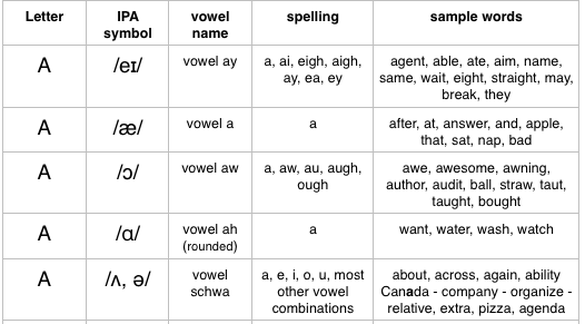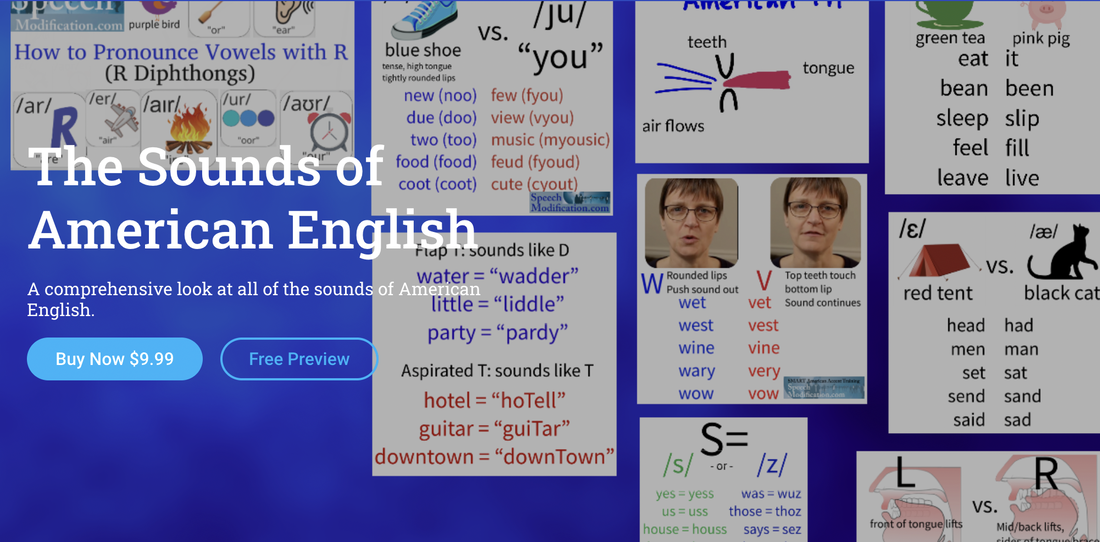|
Vowel sounds in English can be difficult for a number of reasons. Firstly, our native language sound system influences how we hear and pronounce vowels in our second languages. If we do not have a certain vowel sound in our native language, we will tend to hear English through the filter of our first language. For example, many languages have the vowel sound "ah" (in American English this is the vowel sound in the words hot and father.). But fewer languages have the vowel sound "a" (in American English this is the vowel sound in the words at and man.) When speaking English, some non-native speakers will use the "ah" vowel in place of "a." Vowel substitutions and distortions are commonplace and comprise a great deal of what we consider an accent when listening to non-native speakers.
The second reason vowel sounds present difficulties is that we do not have letter-sound correspondence in English. That is to say, one letter does not always represent the same sound. So the written letters A, E, I, O and U do not correspond to just one vowel sound. In addition, the same vowel sound can have multiple spellings, depending on the word context. (More information on vowel sounds and spelling can be found here.) So, given that, how do we know what sound any given written vowel will make in a word? A great way to answer this question is to use an online dictionary, which will allow you to listen to the word as well as view the IPA (International Phonetic Alphabet), which has symbols representing the sounds. Let's take a closer look at the letter A and the vowel sounds it can represent.
The chart above shows five common pronunciations of letter A. Vowel ay /eɪ/ as in able, ate, and name, is often pronounced correctly. When errors occur on this vowel, the mistake we tend to hear is vowel eh (/ɛ/), as in get, rather than ay as in gate. Ay is produced with retracted or smiling lips, whereas eh is produced with a relaxed face. (See video below).
Vowel a /æ/ as in at, man, and bad is a frequently mispronounced vowel in American English. Error patterns tend to be either that we use vowel ay /eɪ/ as in gate or vowel eh /ɛ/ as in get. Vowel aw /ɔ/ as in awesome, ball, and taught can sometimes be confused with with vowel ah /a/ as in hot. Vowel aw has lip rounding and vowel ah does not. The contrast can be heard in the words dawn (sunrise) and don (to put on) or yawn (deep breath) and yon (as in yonder). Some American dialects, such as that spoken in the Pacific Northwest do not differentiate these two vowels. Vowel ah /ɑ/ (rounded) as in want, water, and wash is the almost the same vowel as vowel ah /a/ (unrounded) which is spelled with letter o, as in hot and not. The difference is that the round lips of the w sound change the vowel to be rounded as well. Vowel Schwa /ə/ as in across, about, and extra is the sound we use for some unstressed syllables. The most common error on vowel schwa tends to be using vowel ay because of the letter ay. So you might hear someone pronounce about or across as ay-bout or ay-cross. This in incorrect and the vowel should sound more like "uh." Uh-bout, uh-cross. When we have the word "a," it is pronounced as vowel schwa. Check out this video for help.
Get even more help for pronouncing American vowels, and all of the sounds of English in our online course!
10 Comments
Pronouncing American English vowels can be tricky because written English does not have letter-sound correspondence, which is to say that one letter does not represent one sound. This is particularly true for the letters which represent vowels, namely A, E, I, O and U. Below you will find a guide to the spelled vowels and the sounds they can represent. For an overview sorted by sounds with recordings of each vowel sound, read more here.
|
Categories
All
Archives
May 2024
Have Questions?
Get A Free Consultation We offer a free 30-minute phone consultation. Schedule yours now. |


 RSS Feed
RSS Feed

